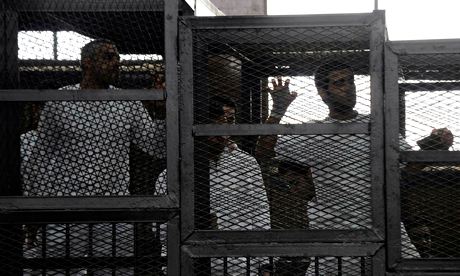
Journalists on trial in Cairo on 24 March for allegedly supporting a terrorist group – the Muslim Brotherhood. On the same day more than 500 Brotherhood supporters were sentenced to death. Photograph: Tarek Wajeh/Almasry Alyoum/EPA
Ever since the interim government in Egypt declared war on the Muslim Brotherhood and designated it a terrorist organisation, it has pursued a course of action that has swelled the ranks of the government's detractors, even among those who are sympathetic to its declared objective of suppressing the Islamist group.
The sentencing to death yesterday of more than 500 Brotherhood supporters on charges related to the violence that followed the overthrow of President Mohamed Morsi in July last year belongs to that class of action: preposterously self-defeating.
The hardliners in the government clearly think overwhelming force is the answer. The security crackdown has severely undermined the Brotherhood's ability to mobilise and stage big street protests. Those who think this way are undoubtedly encouraged by the conduct of the Russian president, Vladimir Putin, in the Ukraine crisis, and the apparent failure of the west to stand up to him. These hawks dismiss any international response to the action of the police or the judiciary as of little consequence.
There's already been a barrage of criticism both inside Egypt and abroad. The procedure itself lacked basic standards of fairness. Many are ridiculing a legal system that allows for a mockery of justice on this scale to take place. The trial lasted two days, and more than half the defendants are on the run.
This is not the first time the Egyptian judiciary has attracted widespread condemnation. Last November a court in Alexandria gave 21 Islamist women and teenagers jail sentences of up to 12 years for taking part in a pro-Brotherhood protest that turned violent. The disproportionate punishment produced a howl of protest. The sentences were later commuted on appeal, and the women were released.
The Egyptian judiciary has a mixed record. It has, for example, given Hosni Mubarak a life sentence, which he's appealed against. He is currently being retried. But none of the police or military accused of killing protesters since the uprising that toppled him in 2011 have been found guilty.
Given this record, most observers will conclude that the verdict is political, designed to send a message to the Brotherhood and its backers abroad – in Cairo this usually means Turkey and Qatar, which have made no secret of their unwavering support for the Brotherhood– that the Egyptian state is still in no mood to compromise with the Islamists: surrender or annihilation.
But coming down with a sledgehammer on anything that moves makes the government look more like a raging bull than a confident operator playing by the rules. It also adds to perceptions of the Brotherhood in the outside world as clear victims, despite the fact that government action against the Islamists still enjoys broad support in Egypt itself.
Within days the electoral commission is expected to issue a timetable for the presidential election. Given that it is the judiciary that will be supervising the election, anything that undermines its independence will cast a long shadow over the electoral process. The credibility of the transition will be called into question if the judiciary is seen to act at the behest of those who hold power.
Yesterday's verdict comes at a critical moment in Egypt's muddled transition from authoritarian rule to what many still hope, despite all the disturbing signs, will be an elected and representative government. Many others remain sceptical, though. Sentencing almost 530 suspects to death en masse will most probably strengthen the scepticism of those who believe Egypt is heading towards anything but democracy and rule of law.

No comments:
Post a Comment